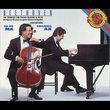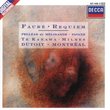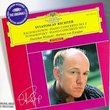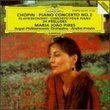| All Artists: Ludwig van Beethoven, Karl Böhm, Dresden Staatskapelle, Eberhard Buchner, Edith Mathis, Franz Crass, Gunther Leib, Gwyneth Jones, James King, Martti Talvela, Peter Schreier, Theo Adam Title: Beethoven: Fidelio Members Wishing: 1 Total Copies: 0 Label: Deutsche Grammophon Release Date: 7/12/2005 Genre: Classical Styles: Opera & Classical Vocal, Historical Periods, Classical (c.1770-1830) Number of Discs: 2 SwapaCD Credits: 2 UPC: 028947755845 |
Search - Ludwig van Beethoven, Karl Böhm, Dresden Staatskapelle :: Beethoven: Fidelio
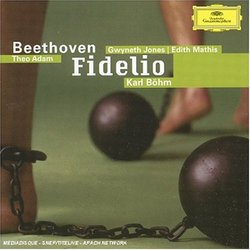 | Ludwig van Beethoven, Karl Böhm, Dresden Staatskapelle Beethoven: Fidelio Genre: Classical |
Larger Image |
CD DetailsSimilar CDsSimilarly Requested CDs
|
CD ReviewsAn exceptional performance on CD at last Brad Alan Deamer | 07/21/2005 (5 out of 5 stars) "I had better "declare an interest," because a previously published and enthusiastic review of this recording, in its original LP version, written by me (using the pseudonym "Roland Graeme") is quoted on the back of the CD's box and on a sticker affixed to its front. If this superb 1969 recording was previously reissued on CD, I missed it. Here it is, as a budget-priced two-CD set, and it's even better than I had remembered it! The only real complaint is the absence of a libretto (the enclosed leaflet does contain a running plot summary, matched to the CD tracks). Despite the recording's age, the sound is startlingly good, with the solo voices placed rather forward, and stereo carefully used to clarify many musical details. Karl Bohm's conducting favors fast tempos and generates a driving intensity. He includes the Leonora Overture Number 3, inserted between the end of the Act 2 Prison Scene and the opera's final scene: the overture is on a separate CD track, so the listener can skip it at will; but the performance is a thrilling one, that fully justifies the interpolation. The Dresden orchestra plays the score as well as any other ensemble has on records. The usual abridgement of the spoken dialogue is included, and the dialogue is done by the singers, not by a separate cast of actors. There is a strong cast. Unless one's standards are superhuman, it would be difficult to find fault with the work of Edith Mathis (Marzelline), Franz Crass (Rocco), or Marti Talvela (Don Fernando). (Mathis, surely one of the most under-rated sopranos of her generation, is especially good.) Theo Adam makes an incisive Pizarro. I know that some people find James King (Florestan) rather stiff in manner, and also find the actual timbre of Peter Schreier (Jacquino) dry and uningratiating; both tenors, however, are in peak form here. When this recording was made, Gwyneth Jones had burst upon the international opera scene as a major star, tackling many of the big dramatic soprano roles, and her performance of Leonora shows why. The voice is powerful, agile, and, at its best, warm and womanly in quality. Jones was an intense performer with a highly personal manner--she pours it on unstintingly here. Hindsight, of course, is always 20/20, and in retrospect one can hear signs of the incipient vocal problems that nearly brought the soprano's career to a halt only a couple of years after this recording was made. (Jones had the last laugh, in a sense, because she recovered and continued to sing some of the most demanding roles in the soprano repertory for another three decades; the recording companies, however, seem to have decided that her sound was "unphonogenic," and as result her studio recordings during those years were few and far between.) Even on this 1969 recording, Jones displays isolated moments of strain and imperfect intonation. Her voice, basically plush and sumptuous in quality, has a tendency to turn hooty or curdled in sound at odd moments, which definitely does not appeal to all tastes: an otherwise magnificent phrase can contain one or two bad notes. Still, this is a memento of an important artist, caught before her singing became controversial. If you're looking for a budget-priced version of this opera, and you already know that you like (or can tolerate) Gwyneth Jones' singing, then this set is a strong contender. " The very best Recording of Fidelio The Cultural Observer | 11/18/2006 (5 out of 5 stars) "Many people say that the best Fidelio in the market is the one recorded by Klemperer on EMI with Christa Ludwig and Jon Vickers. While I would say that that is a great recording, I think listeners would find a better Fidelio in this recording by Karl Böhm made in 1969 with Gwyneth Jones, James King, Franz Crass, Martti Talvela, and Edith Mathis. First of all, I believe that Böhm was in every way a great conductor, much better than many of the big names who made their careers skyrocket by recording constantly with many of the big labels. In this Fidelio, his conducting is animated and full of life. Beethoven's score sings and dances and moves with life, unlike Klemperer's heavy-handed conducting. Böhm was in many ways an ideal interpreter of the German repertoire, and one can see why he was such a favorite in the opera house. His Wagner is probably the best conducted on records, along with his definitive Strauss, Mozart, Bruckner, Haydn, Brahms, and Beethoven. If any conductor can boast having had the most lively interpretations throughout his long and fascinating career, it would probably be Karl Böhm. I, as a fan of Herbert von Karajan, would even say that most of Böhm's recordings surpass his Austrian colleague's. His orchestra in this recording, the Dresden Staatskapelle, plays with clarity, transparity, and sensitivity with a Romantic sound rarely found in a lot of German orchestras. For conducting alone would I give this recording five stars. The cast is exemplary too. The Fidelio/Leonore here is sung by Gwyneth Jones, who is in my opinion the greatest dramatic soprano of the century. Her voice has none of the wide vibrato that would make critics shy away from some of her latter performances, and her interpretation is caught here at its her most intelligent and sensitive best. I find that her Leonore is infinitely more touching than Christa Ludwig's (and definitely more powerful!) and all other sopranos who have touched the role. Her spoken dialogues are done with perfect German, and her interpretation is feminine and touching. A definitive performance! Her Florestan is played by James King, whose voice is simply beautiful. Although his interpretation doesn't have the psychological probing qualities of James King's Florestan, his interpretation is more natural than the Canadian tenor's, and his voice, like I said, is darker and more beautiful than Jon's. Edith Mathis is a reference Marzelline for the beauty of tone and lightness and spontaneity of her voice, while Franz Crass makes a most compelling Rocco. Theo Adam is dramatically right as the villain Don Pizzaro, while Martti Talvela is perhaps the greatest Don Fernando on disc. This is the best recording of Fidelio, and I recommend it to anyone who wants to understand Beethoven's work in its most truthful and theatrical form." One of the best bargain Fidelios Santa Fe Listener | Santa Fe, NM USA | 11/16/2006 (4 out of 5 stars) "The review below seems dead on target about the pluses and minues of this recording, but I'm not sure, once they are balanced out, that Bohm's 1969 Fidelio deserves highest praise. Gwyneth Jones, even in best voice, is an acquired taste. She manages to be much steadier and mellifluous than later on in her career--I've always wished she could have substituted for Gundula Janowitz in Bernstein's Fidelio recording, also from Vienna on DG, since Jones possessed a true dramatic soprano. Bohm doesn't give her much inpsiration to be dramatic, however. His conducting throughout is traditional, correct, and plain.
The opera world is always short of heroic tenors, and by today's standards James King would rank behind only Ben Heppner. He has a powerful, ringing voice, but it's used with little imagination. He's sturdy but not at all moving. I prefer Patzak, Vickers, and Mc Cracken on competing sets; it would have been nice if King, too, could have replaced Rene Killo under Bernstein's inspired direction. All the secondary roles are very well sung. I know I sound tepid in my recommendation, but this bargain set beats out many ohters overall. Among full-price versions in stereo, the Klemperer, Karajan, and Bernstein sets remain untouched." |




